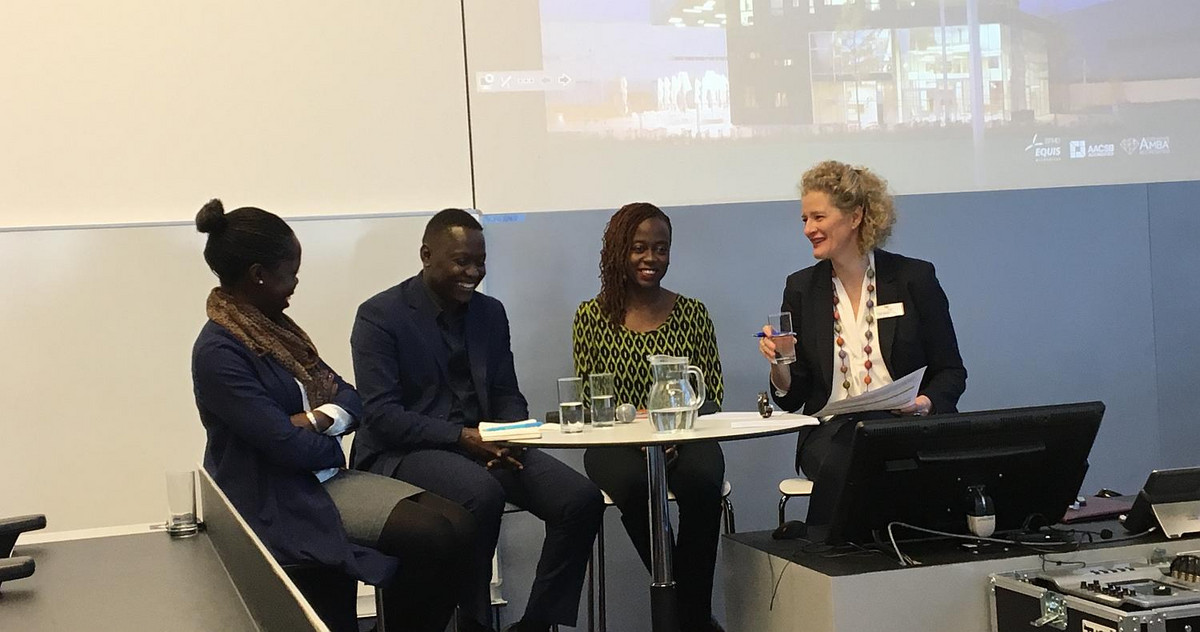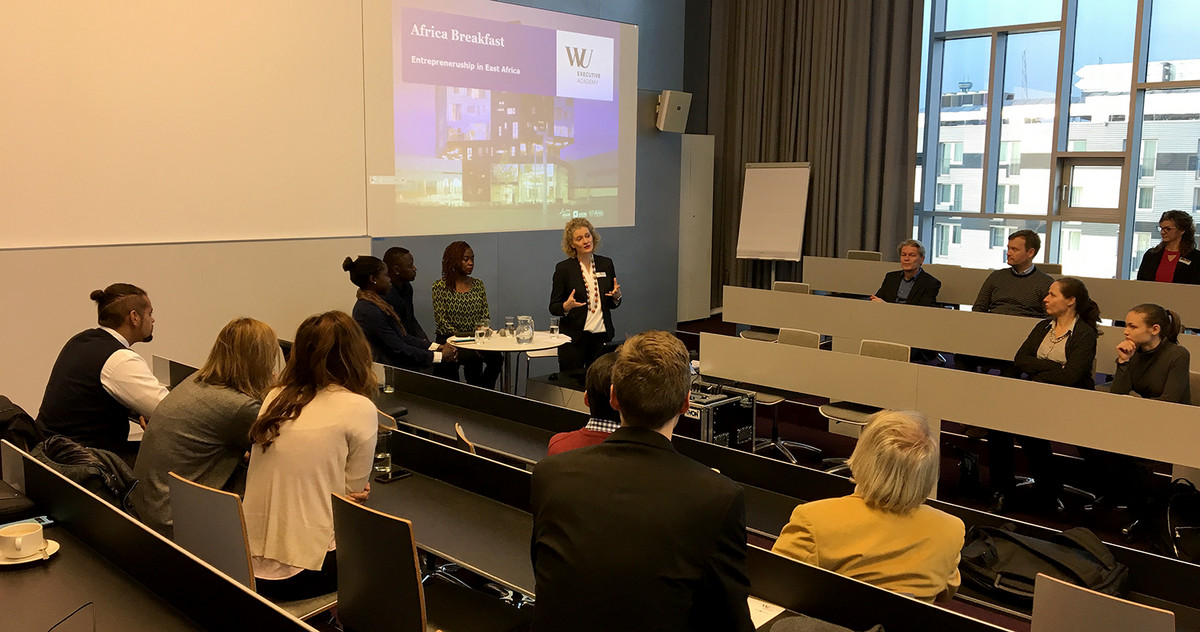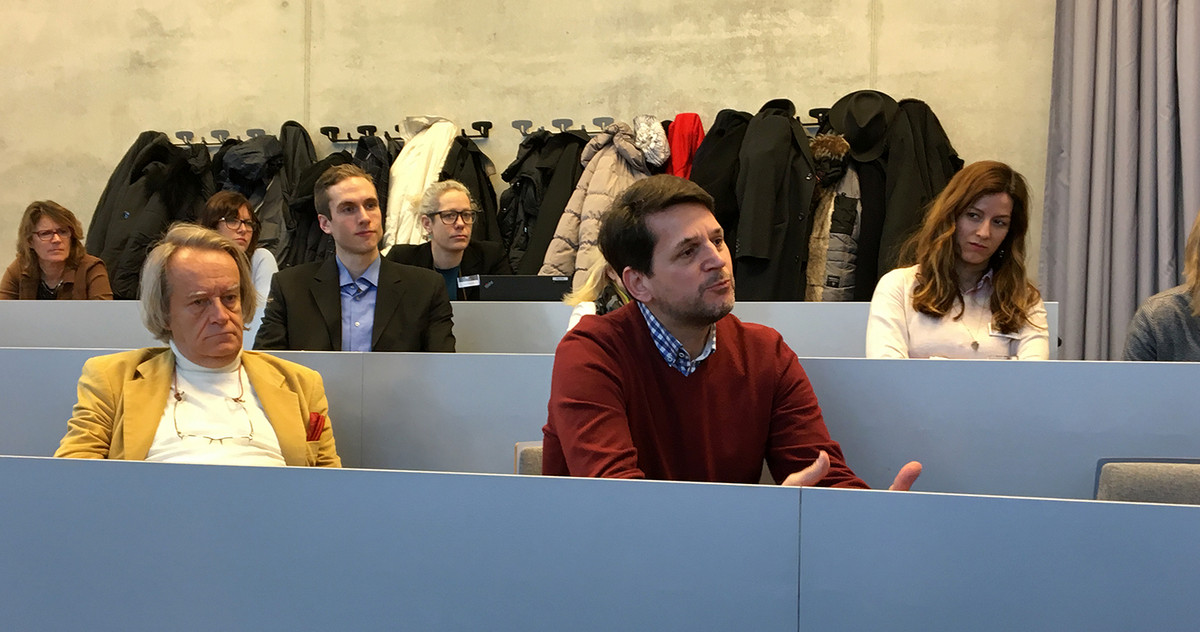Overview
Recommendations
Next Steps
Social media
Entrepreneuership experts from East Africa shared their insights
On the occasion of an Africa Breakfast held at the WU Executive Academy on December 19, 2018, exciting guests from Mombasa, Nairobi and Kigali compared notes on innovation and entrepreneurship in East Africa, and discussed the question of why strategic partnerships are irreplaceable in order to achieve long-term success.

In spring 2018, Prof. Barbara Stöttinger, Dean of the WU Executive Academy, embarked on a learning journey to the “Silicon Savannah” in East Africa. The trip was organized by Africa expert and management consultant Hans Stoisser. She returned fascinated by the innovative potential found in Kenya, and with a wealth of surprising insights under her belt. As luck would have it, three innovation experts based in this region of East Africa attended the EU-Africa summit that was held in Vienna shortly before Christmas. The WU Executive Academy seized the opportunity and invited the trio to share their expertise during a recent “Africa Breakfast”.

In East Africa, digitization is spreading—particularly in urban areas, but it's also expanding here and there into rural places. The increase in IT and tech know-how is leading to the emergence of what is known as innovation hubs, i.e. centers where entrepreneurs, experts and techies are working on solving social problems.

Maryanne Akoth holds the position of Incubation Manager at TechBridge Invest, a start-up incubator in Mombasa, Kenya. “We offer young people an opportunity to put their ideas to the test and build prototypes,” she recounts during the panel discussion, adding that the would-be entrepreneurs are provided not only with seed money and assistance when it comes to finding investors but also with trainings and support from Kenyan as well as Western mentors. According to her, the level of youth unemployment in Mombasa is very high: “The young are well-educated and have the necessary technical skills, but the right jobs do not exist for them.” She goes on to say that the pressure for change is mounting: “Our politicians are increasingly focusing on the private sector,” Maryanne Akoth explains.
Amollo Ambole holds the position of Strategy Lead at the Living Lab of the University of Nairobi in Kenya. Since 2017, the Living Lab has brought research and the needs of the Nairobian community together. In the context of its projects, researchers, stakeholders and business experts team up with one another. Leaving ivory-tower intellectualism behind, the lab provides a forum for co-creation and design thinking where people make a joint effort to address societal problems. According to Amollo Ambole, there are systemic barriers to innovation. “At university, we make students fit for the knowledge sector, but the jobs we train them for do not exist in our country,” she says. Therefore, the Living Lab helps students create their own jobs. “In three months, they learn how to translate their skills into their own businesses,” she adds.

Aphrodice Mutangana holds the position of General Manager at kLab (knowledge Lab) in Kigali, Rwanda's first major innovation hub. kLab not only brings entrepreneurs and techies together by organizing workshops, hackathons and events but also provides students and recent graduates from the region with a forum for developing their ideas into viable business models. “Every second person living in Rwanda is younger than 20; 75% of the population are under 35. Investing in the young is an enormous opportunity for the entire country,” stresses Aphrodice Mutangana. Initially, kLab had hardly any money. As there are many disused restaurants and bars in Rwanda, it decided to rent the premises of a former Chinese restaurant. The big advantage in Rwanda, Aphrodice Mutangana says, is that “within six hours you can start a business online.”
Since 2012, kLab has brought forth 200 businesses, and more than 600 jobs have been created. So far, 60 of these companies have broken even. As Aphrodice Mutangana explains, three factors still cause many fledgling entrepreneurs to fail: “insufficient time, inappropriate teams and inadequate business models.”

Making an appeal to the audience to invest in Africa’s innovative strength, he says: “We need more investors and strategic partnerships. Some countries are corrupt, that's true—but Africa is diverse and full of potential”. He points out that, under its new president, Rwanda, for instance, pursues a policy of zero tolerance towards corruption, including long prison sentences for the corrupt. “But what really matters is to develop an understanding of our ecosystems, our mentalities and our cultures.” Aphrodice Mutangana also says a number of investors are already active in Ghana, Kenya, Nigeria and Rwanda, adding that many come from Singapore, China and Western countries such as Great Britain.
In conclusion, the three experts agree on one thing - you cannot hurry innovation: “It takes time for change to happen,” says Amollo Ambole, summarizing the crux of the matter in a nutshell.
Read more on the 8 biggest business myths about Africa here.